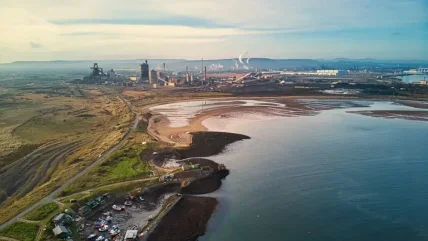
Equinor, alongside project partners BP and TotalEnergies, has taken the financial investment decision (FID) on two carbon capture and storage (CCS) initiatives in the UK, namely the Northern Endurance Partnership (NEP) and Net Zero Teesside Power (NZT Power).
Located in Teesside, the projects are part of the East Coast Cluster (ECC), one of the UK government’s first selected CCS clusters. These projects are expected to advance the decarbonisation of the UK’s industrial regions and support the nation’s climate goals.
Combined, the CCS projects represent an investment of approximately £4bn, with construction contracts awarded to nine engineering, procurement, and construction firms.
These developments are expected to generate thousands of jobs and deliver significant socio-economic benefits to the north-east of England.
NEP will serve as the carbon dioxide (CO₂) transportation and storage provider for the ECC. The project’s construction is scheduled to begin in mid-2025, with operations expected to begin by 2028.
It will include an onshore CO₂ gathering network, compression facilities, a 145km offshore pipeline and subsea injection and monitoring facilities. These facilities will connect to the Endurance saline aquifer, located approximately 1,000m beneath the seabed.
Equinor marketing, midstream and processing executive vice president Irene Rummelhoff said: “It is a major milestone to have agreed Final Investment Decision and financial close on two of the UK’s first carbon capture, transport and storage infrastructure projects.
“This demonstrates how the industry, alongside the UK Government, have progressed a business model for new power supply and carbon capture, transport and storage services to decarbonise the most carbon intensive region in the UK.”
Initially, the NEP project aims to handle up to four million tonnes of CO₂ per year, with capacity projected to rise to an average of 23 million tonnes annually by 2035 through future cluster expansions.
The NZT Power project will house a gas-fired power plant equipped with carbon capture technology.
Designed to generate up to 742MW of flexible, decarbonised power, the plant will provide electricity equivalent to the demand of around one million households in the UK.
The project will capture up to two million tonnes of CO₂ annually, which will be transported and stored via NEP infrastructure.
Equinor holds a 45% stake in NEP and a 25% stake in NZT Power, with BP acting as the operator and majority shareholder in both projects. TotalEnergies owns a 10% stake in NEP.
The NEP project has also received government approval to advance development engineering for the Humber Carbon Capture Pipeline (HCCP). This pipeline will facilitate the transport of CO₂ from future carbon capture projects in the Humber region.
Additionally, the project has been granted the UK’s first CO₂ transport and storage licence under the Transportation and Storage Regulatory Investment (TRI) regime. It also has carbon dioxide storage permit from the North Sea Transition Authority.
The NEP infrastructure will initially support the NZT Power, H2Teesside, and Teesside Hydrogen CO2 Capture projects.
TotalEnergies carbon neutrality new business senior vice president Arnaud Le Foll said: “NEP is a frontrunner project and we look forward to transporting and permanently storing CO2 from one of the UK’s largest industrial regions.
“Our stake in NEP contributes to TotalEnergies’ objective to develop significant CO2 storage capacities in the North Sea, where we can leverage our expertise in operations and geosciences.”






